Renault Mégane VS Kia PV5 – Specs, Efficiency & Price Comparison
Which model is the better choice – the Renault Mégane or the Kia PV5? We compare performance (218 HP vs 121 HP), boot capacity (389 L vs ), efficiency (15.40 kWh vs ), and of course, the price (35100 £ vs 33600 £).
Find out now which car fits your needs better!
The Renault Mégane (SUV) is powered by a Electric engine and comes with a Automatic transmission. In comparison, the Kia PV5 (Cargo Van) features a Electric engine and a Automatic gearbox.
When it comes to boot capacity, the Renault Mégane offers 389 L, while the Kia PV5 provides – depending on what matters most to you. If you’re looking for more power, you’ll need to decide whether the 218 HP of the Renault Mégane or the 121 HP of the Kia PV5 suits your needs better.
There are also differences in efficiency: 15.40 kWh vs . In terms of price, the Renault Mégane starts at 35100 £, while the Kia PV5 is available from 33600 £.
Compare all the key specs now and find out which model fits your lifestyle best!
Renault Mégane
The Renault Mégane stands out in the hatchback segment with its chic design and advanced technology features. Its interior offers a spacious and comfortable environment, providing both driver and passengers with a premium experience. Combining impressive handling with economical efficiency, the Mégane caters to those seeking style and practicality in their daily commute.
details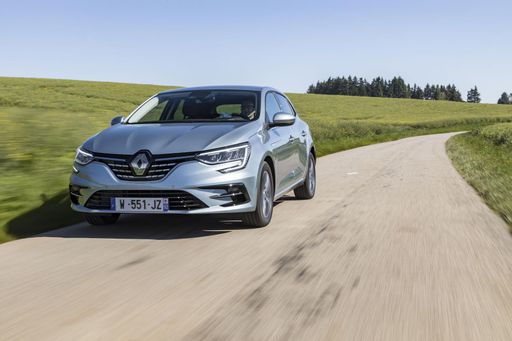 @ Renault
@ Renault
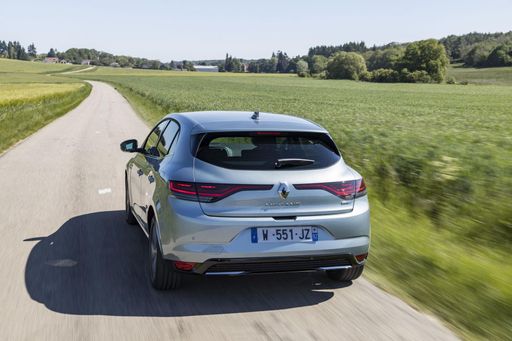 @ Renault
@ Renault
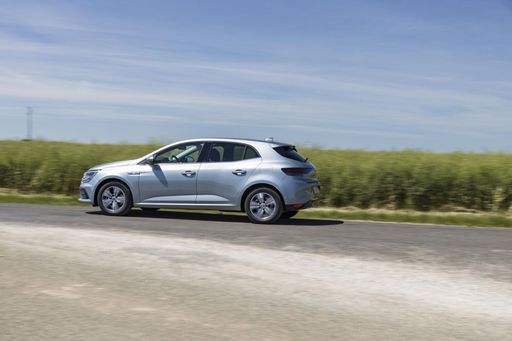 @ Renault
@ Renault
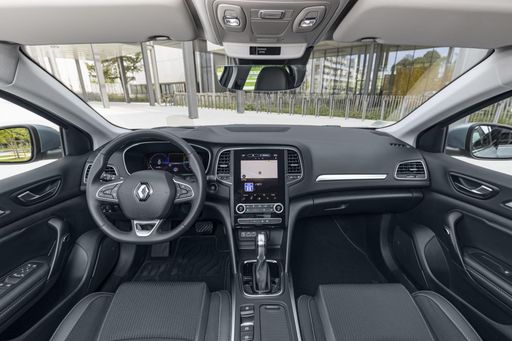 @ Renault
@ Renault
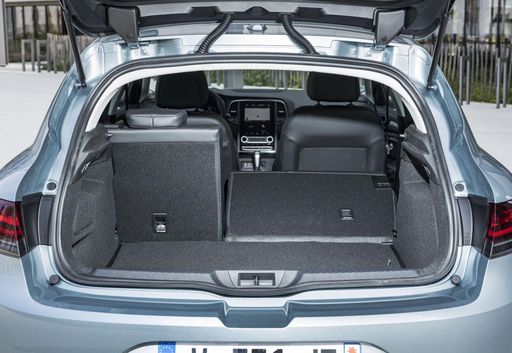 @ Renault
@ Renault
Kia PV5
The Kia EV5 is an exciting new entrant in the landscape of electric SUVs, promising a blend of style and innovation that captures attention. It boasts a sleek and modern design that aligns with Kia's evolving aesthetic identity, blending practicality with eye-catching details. With its foray into the electric vehicle segment, the EV5 is set to offer a highly competitive option for those looking to embrace sustainable mobility without compromising on comfort or tech features.
details

|
|
|
|
|
Costs and Consumption |
|
|---|---|
|
Price
35100 - 38500 £
|
Price
33600 £
|
|
Consumption L/100km
-
|
Consumption L/100km
-
|
|
Consumption kWh/100km
15.40 kWh
|
Consumption kWh/100km
-
|
|
Electric Range
452 km
|
Electric Range
291 km
|
|
Battery Capacity
-
|
Battery Capacity
51.50 kWh
|
|
co2
0 g/km
|
co2
0 g/km
|
|
Fuel tank capacity
-
|
Fuel tank capacity
-
|
Dimensions and Body |
|
|---|---|
|
Body Type
SUV
|
Body Type
Cargo Van
|
|
Seats
5
|
Seats
2
|
|
Doors
5
|
Doors
4
|
|
Curb weight
1719 kg
|
Curb weight
-
|
|
Trunk capacity
389 L
|
Trunk capacity
-
|
|
Length
4200 mm
|
Length
4695 mm
|
|
Width
1783 mm
|
Width
1850 mm
|
|
Height
1505 mm
|
Height
1923 mm
|
|
Payload
446 kg
|
Payload
-
|
Engine and Performance |
|
|---|---|
|
Engine Type
Electric
|
Engine Type
Electric
|
|
Transmission
Automatic
|
Transmission
Automatic
|
|
Transmission Detail
-
|
Transmission Detail
Reduction Gearbox
|
|
Drive Type
Front-Wheel Drive
|
Drive Type
Front-Wheel Drive
|
|
Power HP
218 HP
|
Power HP
121 HP
|
|
Acceleration 0-100km/h
7.40 s
|
Acceleration 0-100km/h
16.30 s
|
|
Max Speed
160 km/h
|
Max Speed
135 km/h
|
|
Torque
300 Nm
|
Torque
250 Nm
|
|
Number of Cylinders
-
|
Number of Cylinders
-
|
|
Power kW
160 kW
|
Power kW
89 kW
|
|
Engine capacity
-
|
Engine capacity
-
|
General |
|
|---|---|
|
Model Year
2025
|
Model Year
2025
|
|
CO2 Efficiency Class
A
|
CO2 Efficiency Class
A
|
|
Brand
Renault
|
Brand
Kia
|
Renault Mégane
Breaking New Ground: The Latest Renault Mégane Models
The Renault Mégane has long been a staple in the line-up of urban-centric and energy-efficient vehicles. As the world leans more towards sustainable driving, the latest models of the Renault Mégane continue to push the envelope with its innovative features and technical prowess.
Innovative Powertrain: The Heart of Mégane
The latest Mégane series comes equipped with an electric motor, offering a performance range of 130 to 218 PS (96 to 160 kW). This ensures that drivers not only benefit from emission-free motoring but also from robust performance figures, with a torque ranging between 250 to 300 Nm. The models are designed to provide a seamless driving experience with their automated front-wheel-drive system.
Efficiency Meets Performance
These Mégane models boast electric consumption figures from 14.9 to 15.4 kWh/100 km, impressive for their class, and are capable of achieving a range between 308 to 460 km on a single charge. The acceleration from 0-100 km/h varies between a peppy 7.4 seconds to a more leisurely 10.5 seconds, depending on the variant, all while maintaining a top speed of 150-160 km/h.
Modern Appeal with Practical Design
Renault’s attention to design is evident in the Mégane's contemporary aesthetic. Whether you opt for the Equilibre, Evolution, Iconic, or Techno trim, each is packed with thoughtful features ensuring comfort for its five passengers and a reasonable boot capacity of 389 litres. The sleek SUV silhouette runs 4,200 mm in length and 1,768 mm in width, giving it a commanding road presence without compromising on practicality.
Cost Efficiency with Zero Emissions
With prices ranging from €35,600 to €45,900, the Renault Mégane offers a competitive edge in its segment. Additionally, the monthly operating costs sit comfortably between €914 and €1,092. The absence of emissions—at 0 g/km—further places these models in the coveted CO2 efficiency class of A, making them a thoughtful choice for environmentally conscious urban drivers.
Conclusion
The Renault Mégane models stand as a testament to the brand's commitment to innovation, efficiency, and style. With its competitive range, pricing, and features, it efficiently caters to the modern driver's needs, balancing power, efficiency, and sustainability seamlessly.
Kia PV5
A Fresh Perspective on Cargo Vans: The Kia PV5
The Kia PV5 stands as a beacon of innovation in the realm of electric cargo vans. Known for its forward-thinking design and practicality, this model sets a new standard in its class. The PV5 combines cutting-edge technology with an eco-friendly design, redefining the expectations for businesses seeking sustainable transportation solutions.
Electric Power Meets Efficiency
At the heart of the Kia PV5 lies an advanced electric powertrain. The model is equipped with a 51.5 kWh battery, offering an impressive electric range of 291 km on a single charge. This robust power supply pairs with a front-wheel-drive system powered by an electric motor that delivers 121 HP (equivalent to 89 kW), keeping the operations both smooth and efficient.
Sustainability Without Compromise
The commitment to sustainability is evident in the PV5’s zero emissions, with a CO2 output of 0 g/km. The van maintains a CO2 Efficiency Class of A, clearly demonstrating Kia’s dedication to reducing the environmental impact of its vehicles. Businesses adopting the PV5 can confidently promote their green credentials while benefiting from the cost savings associated with electric driving.
Designed for Modern Business Needs
The Kia PV5 Cargo L2H1 Electric Automatic model is engineered for functionality and ease of use. Its spacious design accommodates two seats and offers a generous cargo area, making it perfect for diverse delivery needs. The van spans 4695 mm in length, 1850 mm in width, and 1923 mm in height, providing ample space to maneuver goods with ease.
Performance and Practicality
In terms of performance, the PV5 boasts a torque of 250 Nm and can accelerate from 0 to 100 km/h in 16.3 seconds. While its top speed is capped at 135 km/h, this is more than sufficient for urban and suburban delivery routes. The reduction gearbox ensures smooth transitions as it navigates through daily tasks.
Safety and Innovation
Safety is not compromised with the Kia PV5. It features a suite of safety technologies that support the driver in maintaining control and avoiding incidents. These innovations not only contribute to the safety of the driver and cargo but also offer peace of mind to businesses that prioritize the wellbeing of their workforce and goods.
The Road Ahead for Kia PV5
As the automotive industry continues to move towards electrification, the Kia PV5 exemplifies how cargo vans can adapt to this change seamlessly. It represents an essential step towards more sustainable business operations, providing a viable and efficient option for companies looking to reduce their carbon footprint while enhancing operational efficiency. The Kia PV5 is more than just a vehicle; it’s a strategic asset for any forward-thinking business.
The prices and data displayed are estimates based on German list prices and may vary by country. This information is not legally binding.
